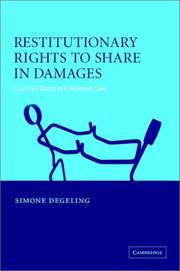| Listing 1 - 10 of 19 | << page >> |
Sort by
|
Book
ISBN: 9789004169746 9004169741 Year: 2008 Volume: 1 Publisher: Leiden: Nijhoff,
Abstract | Keywords | Export | Availability | Bookmark
 Loading...
Loading...Choose an application
- Reference Manager
- EndNote
- RefWorks (Direct export to RefWorks)
Contracts --- Third parties (Law) --- History --- Third persons --- Dispute resolution (Law) --- Agreements --- Contract law --- Contractual limitations --- Limitations, Contractual --- Commercial law --- Legal instruments --- Obligations (Law) --- Juristic acts --- Liberty of contract --- Law and legislation

ISBN: 0814723675 0585480281 9780814723678 9780585480282 0814715141 9780814715147 0814715672 9780814715673 Year: 1998 Publisher: New York, NY : New York University Press,
Abstract | Keywords | Export | Availability | Bookmark
 Loading...
Loading...Choose an application
- Reference Manager
- EndNote
- RefWorks (Direct export to RefWorks)
Why do some conflicts escalate into violence while others dissipate harmlessly? Under what circumstances will people kill, and why? While homicide has been viewed largely in the pathological terms of "crime" and "deviance," violence, Mark Cooney contends, is a naturally-occurring form of conflict found throughout history and across cultures under certain social conditions. Cooney has analyzed the social control of homicide within and across over 30 societies and interviewed several dozens of prisoners incarcerated for murder or manslaughter, as well as members of their families. Violence such as homicide can only be understood, he argues, by transcending the traditional focus on the social characteristics of the killer and victims, and by looking at the role played by family members, friends, neighbors, onlookers, police officers, and judges. These third parties can be a source of peace or violence, depending on how they are configured in particular cases. Violence flourishes, Cooney demonstrates, when authority is either very strong or very weak and when third-party ties are strong and boundaries between groups sharply defined. Drawing on recent theory in the lively new sociological speciality of conflict management, Mark Cooney has culled a vast array of evidence from modern and preindustrial societies to provide us with the first general sociological analysis of human violence.
Third parties (Law) --- Homicide. --- Interpersonal conflict. --- Violence. --- Third persons --- Contracts --- Dispute resolution (Law) --- Femicide --- Offenses against the person --- Violent deaths --- Conflict, Interpersonal --- Conflict (Psychology) --- Interpersonal relations --- Social conflict --- Violent behavior --- Social psychology --- Third parties (Law).
Book
ISBN: 9026819870 Year: 1989 Publisher: Deventer Kluwer
Abstract | Keywords | Export | Availability | Bookmark
 Loading...
Loading...Choose an application
- Reference Manager
- EndNote
- RefWorks (Direct export to RefWorks)
Tort and negligence --- Products liability --- Warranty --- Third parties (Law) --- ABB9005 --- 13.04.c --- Third persons --- Contracts --- Dispute resolution (Law) --- Guaranty --- Commercial law --- Insurance law --- Liability (Law) --- Sales --- Vendors and purchasers --- Manufacturers' liability --- Product liability --- Tort liability of manufacturers --- Wettelijke en contractuele aansprakelijkheid ; Zaken ; Productenaansprakelijkheid --- Law and legislation --- Products liability. --- Warranty. --- Third parties (Law).
Book
ISBN: 3428057058 Year: 1985 Volume: vol 112 Publisher: Berlin Duncker & Humblot
Abstract | Keywords | Export | Availability | Bookmark
 Loading...
Loading...Choose an application
- Reference Manager
- EndNote
- RefWorks (Direct export to RefWorks)
Dispute resolution (Law) --- Third parties (Law) --- 340.11 <430.1> --- Third persons --- Contracts --- ADR (Dispute resolution) --- Alternative dispute resolution --- Collaborative law --- Conflict resolution --- Dispute processing --- Dispute settlement --- Justice, Administration of --- Mediation --- Neighborhood justice centers --- Rechtstheorie. Rechtsvinding--(algemeen)--Westduitsland. Bondsrepubliek Duitsland --- 340.11 <430.1> Rechtstheorie. Rechtsvinding--(algemeen)--Westduitsland. Bondsrepubliek Duitsland --- Appropriate dispute resolution --- Justice. Organisation. Allemagne (Rép. féd.). --- Rechterlijke organisatie. Duitsland (Bondsrep.).
Book
ISBN: 9026835108 Year: 1999 Publisher: Antwerpen : Kluwer rechtswetenschappen,
Abstract | Keywords | Export | Availability | Bookmark
 Loading...
Loading...Choose an application
- Reference Manager
- EndNote
- RefWorks (Direct export to RefWorks)
Payment --- -Payment --- -Third parties (Law) --- -Unjust enrichment --- -Benefits, Unjustified --- Enrichment, Unjust --- Unjustified benefits --- Civil law --- Contracts --- Quasi contracts --- Third persons --- Dispute resolution (Law) --- Commercial law --- Extinguishment of debts --- Performance (Law) --- Balance of trade --- Debtor and creditor --- Law and legislation --- Third parties (Law) --- Unjust enrichment --- Benefits, Unjustified
Book
ISBN: 0387812075 3211812075 Year: 1973 Publisher: Wien
Abstract | Keywords | Export | Availability | Bookmark
 Loading...
Loading...Choose an application
- Reference Manager
- EndNote
- RefWorks (Direct export to RefWorks)
Debtor and creditor --- Third parties (Law) --- Transfer (Law) --- 347.41 <436> --- 347.41 <436> Verbintenissen, schulden, verplichtingen--(verbintenissenrecht algemeen)--Oostenrijk --- Verbintenissen, schulden, verplichtingen--(verbintenissenrecht algemeen)--Oostenrijk --- Alienation (Law) --- Acquisition of property --- Property --- Singular succession --- Third persons --- Contracts --- Dispute resolution (Law) --- Law of real property --- Law of obligations. Law of contract --- Germany

ISBN: 1107130255 1280430303 0511179278 051106327X 0511203187 051130630X 0511495501 0511071736 9780511179273 9780511063275 9780511071737 9780511495502 9780521800655 052180065X 052180065X 9780521036962 9781107130258 9781280430305 9780511203183 0521036968 9780521036962 Year: 2003 Publisher: Cambridge New York Cambridge University Press
Abstract | Keywords | Export | Availability | Bookmark
 Loading...
Loading...Choose an application
- Reference Manager
- EndNote
- RefWorks (Direct export to RefWorks)
Rights and obligations can arise, amongst other things, in tort or in unjust enrichment. Simone Degeling deals with the phenomenon whereby a stranger to litigation is entitled to participate in the fruits of that litigation. Two prominent examples of this phenomenon are the carer, entitled to share in the fund of damages recovered by a victim of tort, and the indemnity insurer, entitled to participate in the fruits of the insured's claim against the wrongdoer. Degeling demonstrates that both are rights raised to reverse unjust enrichment. Careful examination of these two categories reveals the existence of a novel policy-motivated unjust factor called the policy against accumulation. Degeling argues that this is an unjust factor of broad application, applying to configurations other than that of the carer and the indemnity insurer. This will interest restitution and tort lawyers, both academic and practitioner, as well as academic institutions and court libraries.
Damages --- Third parties (Law) --- Restitution --- Unjust enrichment --- Benefits, Unjustified --- Enrichment, Unjust --- Unjustified benefits --- Civil law --- Contracts --- Quasi contracts --- Third persons --- Dispute resolution (Law) --- Law --- General and Others --- Damages - Great Britain --- Third parties (Law) - Great Britain --- Restitution - Great Britain --- Unjust enrichment - Great Britain
Book
ISBN: 131709834X 1282743562 9786612743566 0754691128 9780754691129 9780754646976 0754646971 6612743565 1315594668 1317098358 Year: 2010 Publisher: Farnham, Surrey, England Burlington, VT Ashgate
Abstract | Keywords | Export | Availability | Bookmark
 Loading...
Loading...Choose an application
- Reference Manager
- EndNote
- RefWorks (Direct export to RefWorks)
Healthcare professionals face an increasing threat of litigation from parties whom they have never met in their daily medical practice and who look nothing like the traditional patient. This book explores the legal principles and conundrums which arise when determining a healthcare professional's liability in negligence towards a wide variety of non-patients.
Medical personnel --- Third parties (Law) --- Third persons --- Contracts --- Dispute resolution (Law) --- Health care personnel --- Health care professionals --- Health manpower --- Health personnel --- Health professions --- Health sciences personnel --- Health services personnel --- Healthcare professionals --- Medical manpower --- Professional employees --- Malpractice --- Medical personnel - Malpractice - England --- Third parties (Law) - England --- Royaume-Uni --- Droit médical
Book
ISBN: 1282601695 9786612601699 9047440358 9789047440352 9781282601697 9789004169746 9004169741 6612601698 Year: 2008 Publisher: Leiden Boston Martinus Nijhoff Publishers
Abstract | Keywords | Export | Availability | Bookmark
 Loading...
Loading...Choose an application
- Reference Manager
- EndNote
- RefWorks (Direct export to RefWorks)
Through recent changes in Dutch (1992) and English (1999) private law, contracts for a third-party beneficiary are, in Western Europe, nowadays considered to be effective and enforceable. This concept is, however, incompatible with both the civilian tradition on the continent and the traditional parties-only rule of English common law. The purpose of this study is to show how the problem of the third-party beneficiary was dealt with during the various periods of Western legal thought and to discuss the subject from the perspective of present-day comparative law. The book is of interest not only to legal historians, but also to all who are engaged with present-day private law – scholars, practitioners and advanced students. Contributors include David Ibbetson, Regius Professor of Civil Law at the University of Cambridge, and Hendrik Verhagen, Professor of Private International Law, Comparative Law and Civil Law at the Radboud University Nijmegen, attorney at the firm Clifford Chance Amsterdam, and deputy justice at the Court of Appeal, ’s-Hertogenbosch. Studies in the History of Private Law , volume 1
Dritter --- Privatrecht --- Vertragsrecht --- Contracts --- Agreements --- Contract law --- Contractual limitations --- Limitations, Contractual --- Commercial law --- Legal instruments --- Obligations (Law) --- Juristic acts --- Liberty of contract --- Third parties (Law) --- History. --- Law and legislation --- Geschichte --- Europa --- Third persons --- Dispute resolution (Law) --- Contracts - Europe - History --- Third parties (Law) - Europe - History
Book
ISBN: 1107196833 0511575912 0511508328 0511504608 0511508980 0511506740 9780511508325 9780521863889 0521863880 9780511508981 9780511575914 1282058444 9781282058446 9781107411333 1107411335 9781107411333 Year: 2009 Publisher: Cambridge, UK New York Cambridge University Press
Abstract | Keywords | Export | Availability | Bookmark
 Loading...
Loading...Choose an application
- Reference Manager
- EndNote
- RefWorks (Direct export to RefWorks)
The focus of this book, the legal situation created when an agent acts without authority, is one of the most important issues in agency law. The analysis is divided into three sections: apparent authority, ratification and the liability of the falsus procurator. Adopting a unique comparative perspective, the contributions are drawn from many different legal systems, providing the opportunity for analysis of the European common law/civil law divide. The analysis extends beyond Europe, however, taking into account the mixed legal system of South Africa, as well as the United States. Finally, there is a useful consideration of the Principles of European Contract Law and the UNIDROIT Principles of International Commercial Contracts 2004. This study will be an invaluable guide for those interested in the study of comparative law, international practitioners and those interested in the harmonisation of European Private Law.
Agency (Law) --- Commercial agents --- Agents, Commercial --- Business agents --- Commission merchants --- Attorneys --- Principal and agent --- Commercial law --- Contracts --- Partnership --- Mandate (Contract) --- Fraud --- Third parties (Law) --- 347.45 --- Third persons --- Dispute resolution (Law) --- Commercial fraud --- Deceit --- Misrepresentation (Crime) --- Commercial crimes --- Deception --- Torts --- Hoaxes --- Impostors and imposture --- 347.45 Bijzondere overeenkomsten --(algemeen) --- Bijzondere overeenkomsten --(algemeen) --- Fraud. --- Falsus procurator --- Law --- General and Others
| Listing 1 - 10 of 19 | << page >> |
Sort by
|

 Search
Search Feedback
Feedback About UniCat
About UniCat  Help
Help News
News